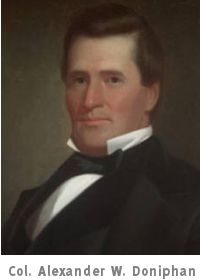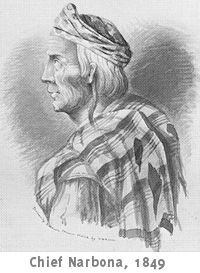The Bear Spring Treaty was the first treaty made with the Navajo tribe. It affected the traditional Navajo homelands, which stretched from Arizona through western New Mexico, where there was a long history of Southwest bands raiding and trading with each other all the way back into the late 1500s. The people who shared this geographical area included Navajo, Spanish, Mexican, Apache, Comanche, Ute, and after 1846, American settlers. A Navajo raid on Socorro, New Mexico near the end of September, 1846, precipitated this American Indian treaty with the United States.

Bear Spring Treaty
Signed: November 21, 1846
Ratified:
Proclaimed:
Principal Signatures: Colonel Alexander Doniphan for the United States, and Chief Narbona for the Navajo
General Stephen W. Kearny heard about the raid on Socorro, and told his second-in-command in Santa Fe to send a regiment of soldiers into Navajo country and secure a peace treaty with them.
 Col. William Doniphan and a detachment of 30 men made contact with the Navajo and spoke to the Navajo Chief Narbona in mid-October. A second meeting between Chief Narbona with five hundred Navajo and Col. Doniphan occurred on November 21. They met at Bear Spring, (Ojo del Oso), near where Fort Wingate would later be built. Doniphan informed the Navajo that all their land now belonged to the United States, and the Navajo and New Mexicans were the “children of the United States.”
Col. William Doniphan and a detachment of 30 men made contact with the Navajo and spoke to the Navajo Chief Narbona in mid-October. A second meeting between Chief Narbona with five hundred Navajo and Col. Doniphan occurred on November 21. They met at Bear Spring, (Ojo del Oso), near where Fort Wingate would later be built. Doniphan informed the Navajo that all their land now belonged to the United States, and the Navajo and New Mexicans were the “children of the United States.”
We know of this treaty from the journal entry of a Private Hughes, who served under Colonel Doniphan. His account may be the only existing eye-witness description of the 1846 meeting between Doniphan and Navajo leaders at Ojo Oso (Bear Spring).
Wording of the Treaty
 ARTICLE I. A firm and lasting peace and amity shall henceforth exist between the American people and the Navajo tribe of Indians.
ARTICLE I. A firm and lasting peace and amity shall henceforth exist between the American people and the Navajo tribe of Indians.
ARTICLE 2. The people of New Mexico and the Pueblo Indians are included in the term American people.
ARTICLE 3. A mutual trade, as between people of the same nation, shall be carried on between these several parties; the Americans, Mexicans, and Pueblos being free to visit all portions of the Navajo country and the Navajos all portions of the American country without molestation, and full protection shall be mutually given.
ARTICLE 4. There shall be mutual restoration of all prisoners, the several parties being pledged to redeem by purchase such as may not be exchanged each for each.
ARTICLE 5. All property taken by either party from the other, since the 18th day of August, last, shall be restored.
The undersigned, fully empowered to represent and pledge to the above articles their respective nations, have accordingly hereunto signed their names and affixed their seals.
Signatures representing the United States
Alexander W. Doniphan
Colonel commanding 1st Regt. Missouri Volunteers.
Congreve Jackson
Lieutenant-colonel commanding 1st Battalion
William Gilpin
Major commanding the 2d Battalion
Signatures of the Navajo Chiefs
| His mark | His mark | ||
| Sarcilla Largo
Caballada de Mucho Alexandro Sandoval Kiatanito Jose Largo Narbona |
X
X X X X X X |
Sagundo
Pedro Jose Manuelito Tapio Archulette Juanico Savoietta Garcia |
X
X X X X X X |

